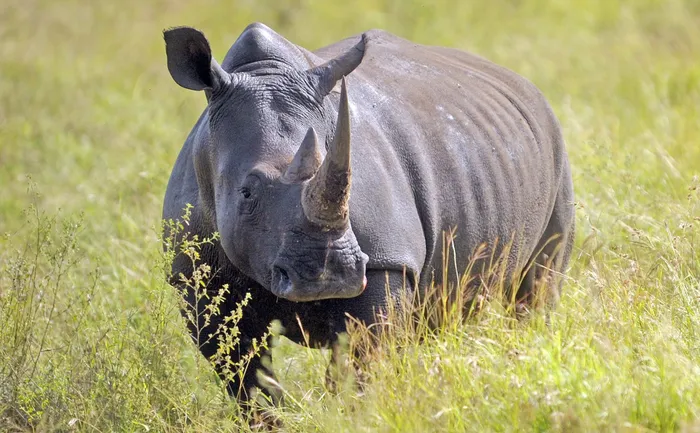Rhino poaching – A national shame threatening South Africa’s soul, economy and global standing

The writer says every rhino killed is a symbol of how close we are to losing ourselves.
Image: File
Rhino poaching is not just a conservation crisis, it is a national emergency that strikes at the heart of South Africa’s identity, economy, and global reputation. Every rhino slaughtered is not only a brutal reminder of the greed driving illicit wildlife trafficking, but a symbol of how close we are to losing one of the most iconic species that define us as a nation.
South Africa is globally recognised as one of the 17 mega-diverse countries in the world, a prestigious title reserved for nations that harbour the majority of Earth's species and are exceptionally rich in biodiversity. Our landscapes are home to an astonishing variety of flora and fauna found nowhere else on the planet. Being mega-diverse means having high levels of endemism and a wide range of ecosystems. It is both an honour and an enormous responsibility, one we are rapidly undermining through the unchecked killing of rhinos and other endangered species.
Our legacy in conservation is a proud one. The remarkable story of the southern white rhino, brought back from the brink of extinction by the unwavering commitment of Dr Ian Player and his trusted tracker and partner Magqubu Ntombela, is globally revered. Through their efforts and the backing of institutions like South African National Parks (SANParks), this species was saved and given a second chance at survival. That same spirit of conservation has continued in the protection of the Cape Mountain zebra, bontebok, whales, great white sharks, and many more species now thriving because of protected areas and decisive action.
Yet today, the gains of decades are being unraveled by the greed of a few, threatening to cost the entire nation. Rhino poaching is not just a wildlife crime; it is an economic crime, a reputational risk, and a moral failure.
Tourism, especially eco-tourism, is a cornerstone of our economy. It brings in billions of rands annually, creates thousands of jobs, and supports countless small businesses, particularly in rural areas. The destruction of our wildlife heritage jeopardises this vital industry. International tourists do not come to South Africa to see empty savannahs. They come for the Big Five. They come for living symbols of the African spirit, rhinos, lions, elephants, and hippos. They come to experience something sacred and awe-inspiring. If we fail to protect our rhinos, what will they come for next?
Worse still, the reputational damage from poaching threatens South Africa's international credibility. Conservation has long been a point of pride and a diplomatic asset, drawing global partnerships, research funding, and investment in protected area management. If we are seen as a country complicit or worse, indifferent to the extermination of its natural assets, we risk becoming isolated in the global community.
This loss is not only ecological and economic, it is deeply cultural and spiritual. In our African traditions, animals are not just wildlife, they are totems, part of our identity and ancestry. Families trace their lineages and spiritual guardianship to creatures like Bakoena (crocodiles), Bataung (lions), Bakubung (hippos), BaTlou (elephants), and Batshweneng (baboons). These names are not arbitrary, they are living connections to our past, our values, and our heritage. To kill them is to kill a part of ourselves.
As South Africans, we have every reason to protect, love, and care for these species. They are our soul, our heartbeat, our lifeline. A nation that loses touch with its history, its natural heritage, and its totems becomes a nation unanchored, adrift and vulnerable. As the saying goes, “A people without knowledge of their past is like a tree without roots.”
We must never forget that conservation is an economic enabler. It supports efforts to combat the triple challenges of poverty, unemployment, and inequality. It provides meaningful work in anti-poaching units, park management, eco-guiding, and community development. In a country where opportunities remain scarce, conservation offers hope, but only if we protect the very assets it depends on.
Let us be clear: there is no honour in crime. There is no pride in blood money. Material accumulation through the slaughter of our wildlife has never built a community or a nation. It has only brought shame, division, and devastation. We must stop hero-worshipping poachers and syndicates who masquerade as "providers." They are not heroes. They are thieves of our future - of our heritage - of our identity.
The madness must stop.
South Africa must stand firm. We must strengthen our laws, empower our rangers, support community conservation, and ensure those who harm our wildlife are put behind bars. We owe this not only to the rhinos and all they represent but to ourselves and future generations who deserve to inherit a living, breathing legacy.
Our natural heritage is not a luxury, it is our lifeblood.
Let’s protect it fiercely, fearlessly, and together.
* Rey T Thakhuli – is the General Manager: Communications, Kruger National Park
Related Topics: